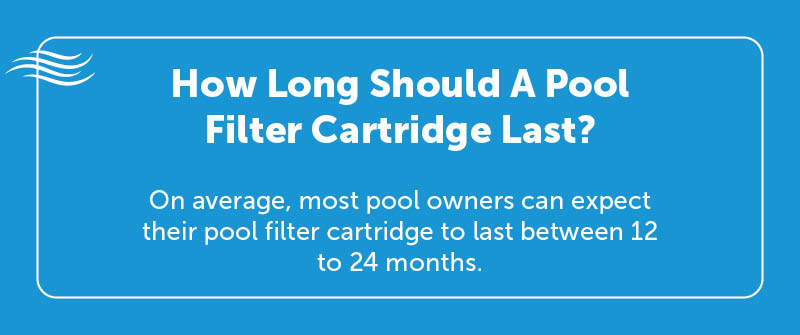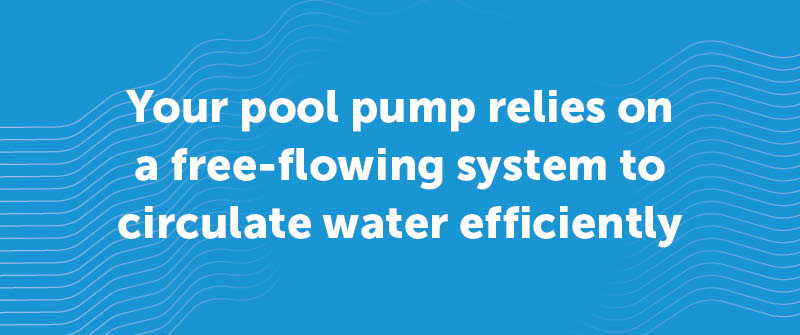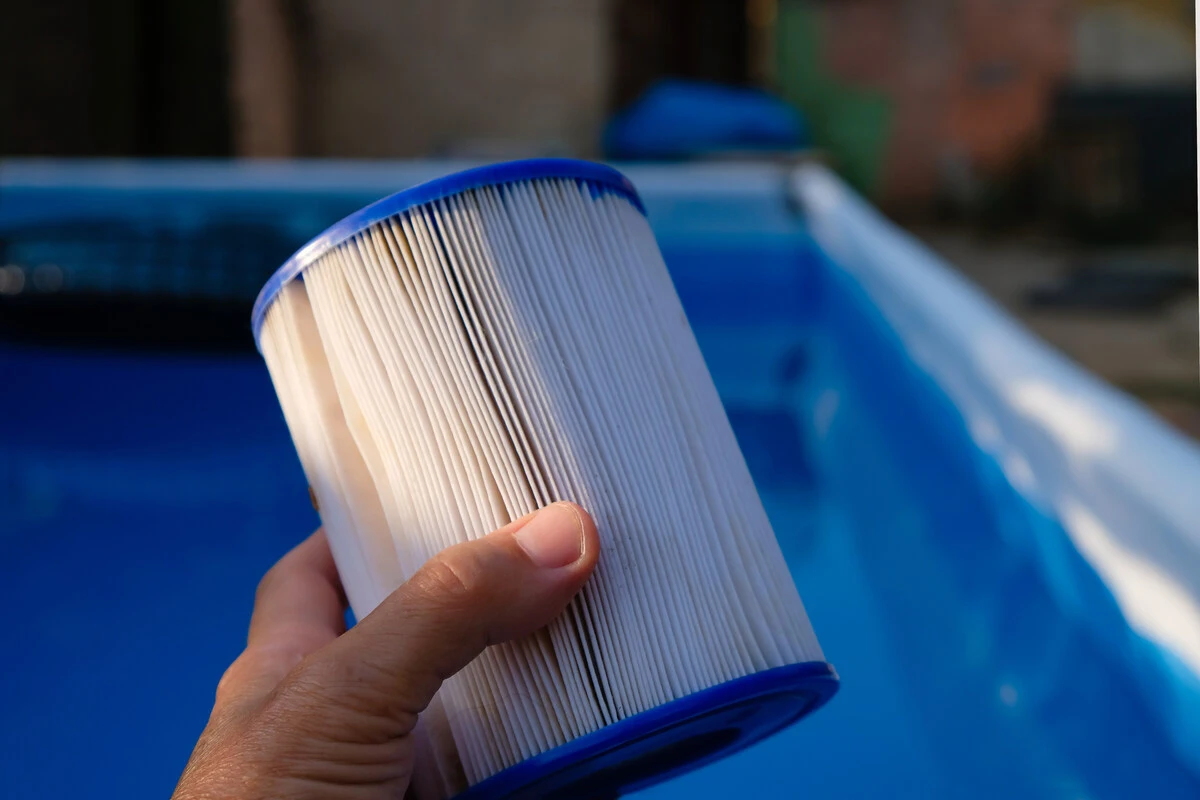A well-functioning and clean filter cartridge is essential for maintaining clean and clear pool water. However, over time, pool filters may become compromised, leading to less effective filtration. Here are several indicators that your filter cartridge may be bad.
Obvious Signs Of Wear And Tear
Inspect your filter for visible signs of wear and tear. Look for frayed or ripped material, which can compromise the filter’s ability to trap debris. If the pleats are flattened or deformed, the filter may not be functioning efficiently. Regular visual inspections can help identify these issues early.
Reduced Water Flow
If you notice a significant reduction in water flow, it might be an indication of a bad cartridge. As filters clog and degrade, they restrict the flow of water, which could lead to inadequate circulation and filtration.
Increased Pressure Gauge Readings
Your pool system’s pressure gauge can also provide clues about filter pressure. A filter under duress often results in increased pressure. High-pressure readings suggest that the filter might be clogged or damaged, necessitating inspection or replacement.
Physical Damage To The Filter Material
Physical damage, such as cracks, breaks, or tears in the filter material, is a clear sign that the cartridge needs replacing. Such damage renders the filter ineffective, allowing debris to pass into the pool.
How Long Should A Pool Filter Cartridge Last?
Understanding The Lifespan Of A Pool Cartridge Filter
The lifespan of a pool cartridge filter can vary based on several factors, but generally, a well-maintained cartridge should last between one and two years. Proper care and usage play significant roles in determining its longevity. Regular maintenance and cleaning routines can extend the life of your filter, ensuring that it continues to function efficiently.
Typical Lifespan Of A Cartridge Filter
On average, most pool owners can expect their pool filter cartridge to last between 12 to 24 months. The specific type of your filter, such as pool filter cartridge A or C, might also influence its durability. It’s important to follow the manufacturer’s guidelines regarding care and frequency of use to maximize lifespan.

Factors Affecting Cartridge Longevity
Several factors can influence how long your pool filter lasts. Frequent use, poor water quality, and not cleaning the filter regularly can significantly shorten its lifespan. Environmental factors like exposure to sunlight and usage of pool chemicals also play a role. Ensuring balanced pool chemistry contributes to extending the filter’s life as well. Using a garden hose to rinse off debris from the filter can help maintain its efficiency and extend its lifespan.
Comparing The Lifespan Of Different Types
While the basic principle of cleaning water is the same, different types of filters, such as cartridge, sand, and DE (diatomaceous earth) filters, have different lifespans. Cartridge filters usually offer a good balance of cost and longevity, providing a popular choice among pool owners. They might require replacement more often compared to sand filters but are generally less cumbersome and expensive than DE options.
How Do I Know When To Replace My Cartridge Filter?
Frequency Of Replacement Based On Usage
To determine how often to replace your pool filter cartridge, it’s crucial to consider how frequently you use your pool. For a pool that’s in use most days during the summer, you might find that replacing the cartridge every 1-2 years is necessary. Conversely, a pool used less frequently might only require a cartridge replacement every 2-3 years. Regular assessment of your pool’s condition and water clarity will guide you in making this decision. Moreover, frequent checks ensure that debris and contaminants are consistently removed, preserving the health of your pool environment.
Visual Inspection Guidelines
Regular visual inspections are an effective way to track the condition of your pool filter cartridges. Look for signs of wear such as fraying or tears in the filter material, calcification, or cracks on the end caps. These signs indicate that your cartridge may not be effectively filtering debris from the water. Additionally, if the cartridge’s pleats are flattened or matted with dirt, it’s a signal that the filter is past its prime. Catching these issues early can help maintain your pool’s hygiene and prevent any potential damage to the overall filtration system.
Cost Considerations For Replacements
When planning for a replacement cartridge, consider the cost involved. While quality cartridges might be a bit pricier, they usually offer longer durability and better performance. Investing in a reliable filter can also save on potential repairs and additional maintenance down the line. Compare different brands and types to find the best value for your money, keeping in mind that a higher initial cost might equate to more extended periods between replacements. Opting for a reputable cartridge can contribute significantly to maintaining a clean and inviting swimming area.
Is It Okay To Run A Pool Pump Without A Filter Cartridge?
Running a pool pump without a filter cartridge may seem like a harmless shortcut, but it can have serious consequences for your pool filters. The primary function of a filter cartridge is to remove debris and particulate matter from the water, maintaining its clarity and hygiene. Without it, your pool’s water circulation system could become clogged with debris, leading to inefficient pump performance and possible damage.
Consequences Of Running Without A Filter Cartridge
The absence of a filter cartridge can lead to blocked pipes and strain on your pool’s circulation system. Additionally, maintaining the pool skimmer and pump basket is crucial to ensure proper water flow and prevent debris from clogging the system. This can cause the pump to work harder, increasing the risk of wear and potential failure. Debris such as leaves, insects, and other dirt can accumulate in the filtration system, thereby blocking water flow and causing the pump to overheat or burn out. Over time, the absence of proper pool maintenance can lead to costly repairs or even replacement of the pump and its components.
Potential Damage To The Pump
Your pool pump relies on a free-flowing system to circulate water efficiently. Without a filter cartridge, dirt and debris can circulate through the pump and internal components, causing erosion and damage. This can significantly shorten the lifespan of your pump, forcing you to spend more on repairs or a replacement. Regularly monitoring water pressure can help identify issues early and prevent damage to the pump.

Recommended Alternatives And Precautions
If you find yourself in a situation where you must operate the pump without a filter cartridge, ensure it is no more than a temporary solution. Be sure to manually skim the pool and manage visible debris regularly. Consider investing in a backup filter or maintaining a cleaning schedule to avoid operating the pump without protection. Better still, plan regular maintenance and timely replacement of filter cartridges to avoid such scenarios altogether.
Ensure optimal pool performance and peace of mind with DiscountFilters.com. Choose from our wide range of high-quality yet affordable filter cartridges that are designed to meet your specific needs, providing easy installation and perfect compatibility. Keep your pool water crystal clear and your system running smoothly without compromise.

